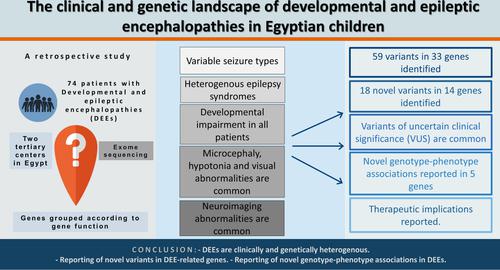当前位置:
X-MOL 学术
›
Clin. Genet.
›
论文详情
Our official English website, www.x-mol.net, welcomes your feedback! (Note: you will need to create a separate account there.)
The clinical and genetic landscape of developmental and epileptic encephalopathies in Egyptian children
Clinical Genetics ( IF 3.5 ) Pub Date : 2024-01-14 , DOI: 10.1111/cge.14481 Nour Elkhateeb 1, 2 , Mahmoud Y. Issa 3 , Hasnaa M. Elbendary 3 , Walaa Elnaggar 2 , Areef Ramadan 2 , Karima Rafat 3 , Mona Kamel 2 , Sherif F. Abdel‐Ghafar 4 , Fawzia Amer 2 , Hebatallah M. Hassaan 5 , Roberta Trunzo 6 , Catarina Pereira 6 , Mohamed S. Abdel‐Hamid 4 , Felice D'Arco 7 , Peter Bauer 6 , Aida M. Bertoli‐Avella 6 , Marian Girgis 2 , Joseph G. Gleeson 8, 9 , Maha S. Zaki 3 , Laila Selim 2
Clinical Genetics ( IF 3.5 ) Pub Date : 2024-01-14 , DOI: 10.1111/cge.14481 Nour Elkhateeb 1, 2 , Mahmoud Y. Issa 3 , Hasnaa M. Elbendary 3 , Walaa Elnaggar 2 , Areef Ramadan 2 , Karima Rafat 3 , Mona Kamel 2 , Sherif F. Abdel‐Ghafar 4 , Fawzia Amer 2 , Hebatallah M. Hassaan 5 , Roberta Trunzo 6 , Catarina Pereira 6 , Mohamed S. Abdel‐Hamid 4 , Felice D'Arco 7 , Peter Bauer 6 , Aida M. Bertoli‐Avella 6 , Marian Girgis 2 , Joseph G. Gleeson 8, 9 , Maha S. Zaki 3 , Laila Selim 2
Affiliation

|
Developmental and epileptic encephalopathies (DEEs) are a heterogeneous group of epilepsies characterized by early-onset, refractory seizures associated with developmental regression or impairment, with a heterogeneous genetic landscape including genes implicated in various pathways and mechanisms. We retrospectively studied the clinical and genetic data of patients with genetic DEE who presented at two tertiary centers in Egypt over a 10-year period. Exome sequencing was used for genetic testing. We report 74 patients from 63 unrelated Egyptian families, with a high rate of consanguinity (58%). The most common seizure type was generalized tonic–clonic (58%) and multiple seizure types were common (55%). The most common epilepsy syndrome was early infantile DEE (50%). All patients showed variable degrees of developmental impairment. Microcephaly, hypotonia, ophthalmological involvement and neuroimaging abnormalities were common. Eighteen novel variants were identified and the phenotypes of five DEE genes were expanded with novel phenotype–genotype associations. Obtaining a genetic diagnosis had implications on epilepsy management in 17 patients with variants in 12 genes. In this study, we expand the phenotype and genotype spectrum of DEE in a large single ethnic cohort of patients. Reaching a genetic diagnosis guided precision management of epilepsy in a significant proportion of patients.
中文翻译:

埃及儿童发育性脑病和癫痫性脑病的临床和遗传状况
发育性癫痫性脑病 (DEE) 是一组异质性癫痫,其特征是与发育退化或损伤相关的早发性难治性癫痫发作,具有异质性遗传景观,包括与各种途径和机制有关的基因。我们回顾性研究了 10 年来在埃及两个三级中心就诊的遗传性 DEE 患者的临床和遗传数据。外显子组测序用于基因检测。我们报告了来自 63 个无亲属关系的埃及家庭的 74 名患者,其中近亲比例很高(58%)。最常见的癫痫发作类型是全身强直阵挛(58%),多种癫痫发作类型也很常见(55%)。最常见的癫痫综合征是早期婴儿 DEE (50%)。所有患者均表现出不同程度的发育障碍。小头畸形、张力减退、眼科受累和神经影像学异常很常见。鉴定出 18 个新变异,并通过新的表型-基因型关联扩展了 5 个 DEE 基因的表型。获得基因诊断对 17 名携带 12 个基因变异的患者的癫痫治疗具有重要意义。在这项研究中,我们扩大了大型单一种族患者队列中 DEE 的表型和基因型谱。达到基因诊断指导了相当一部分患者的癫痫精准治疗。
更新日期:2024-01-14
中文翻译:

埃及儿童发育性脑病和癫痫性脑病的临床和遗传状况
发育性癫痫性脑病 (DEE) 是一组异质性癫痫,其特征是与发育退化或损伤相关的早发性难治性癫痫发作,具有异质性遗传景观,包括与各种途径和机制有关的基因。我们回顾性研究了 10 年来在埃及两个三级中心就诊的遗传性 DEE 患者的临床和遗传数据。外显子组测序用于基因检测。我们报告了来自 63 个无亲属关系的埃及家庭的 74 名患者,其中近亲比例很高(58%)。最常见的癫痫发作类型是全身强直阵挛(58%),多种癫痫发作类型也很常见(55%)。最常见的癫痫综合征是早期婴儿 DEE (50%)。所有患者均表现出不同程度的发育障碍。小头畸形、张力减退、眼科受累和神经影像学异常很常见。鉴定出 18 个新变异,并通过新的表型-基因型关联扩展了 5 个 DEE 基因的表型。获得基因诊断对 17 名携带 12 个基因变异的患者的癫痫治疗具有重要意义。在这项研究中,我们扩大了大型单一种族患者队列中 DEE 的表型和基因型谱。达到基因诊断指导了相当一部分患者的癫痫精准治疗。



























 京公网安备 11010802027423号
京公网安备 11010802027423号